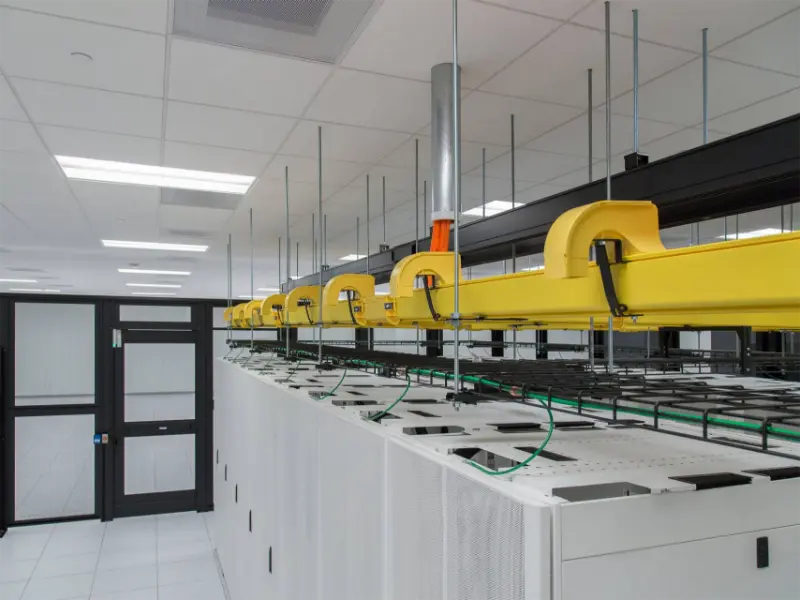- Retail colocation gives SMBs the flexibility to scale their IT infrastructure up or down based on their current needs.
- These facilities are equipped with state-of-the-art security measures and staffed by IT professionals.
- Retail colocation centres offer robust connectivity options and integrate technologies such as AI and IoT.
Retail colocation offers a strategic advantage to small and medium-sized enterprises (SMEs) by providing access to advanced data centre technologies without the high costs typically associated with such infrastructure. As digital technologies become increasingly critical to business operations, retail colocation offers a flexible and reliable solution that supports both growth and innovation.
This service model allows businesses to rent space, such as racks or cages, within a professionally managed third-party data centre, providing scalability, enhanced security and access to high-performance computing environments.
What is retail colocation
Retail colocation is a service that allows businesses to rent physical space and power within a data centre to house their own IT equipment. Customers buy the power and space they need for their servers, storage and networking equipment, as well as the network connectivity and IP addresses they require. The data centre provider provides the infrastructure needed to run the servers optimally, including cooling systems, power, security and network connectivity.
The colocation provider allows businesses to use advanced data centre facilities without the capital expenditure of building and maintaining their own. The key benefit is that it allows companies to focus on their core business while leaving the management of their IT infrastructure to experts. It also provides the flexibility to scale up or down as your business needs change.
In addition, retail colocation services often offer enhanced reliability through redundant power and cooling systems and superior network connectivity, ensuring business continuity and performance. Gartner estimates that downtime costs an average of $5,600 per minute, so increased uptime can deliver significant financial benefits.
Retail Colocation vs. Wholesale Colocation
While both retail and wholesale colocation are offered by data centre providers, their scale and level of service differ significantly. Wholesale data centres cater to large enterprises and hyperscalers with significant IT requirements, offering them dedicated space known as wholesale colocation space.
The customer rents space in a wholesale data centre, essentially occupying an entire facility tailored for their exclusive use. Wholesale providers essentially provide a private data centre. This model primarily benefits hyperscalers – companies with large IT requirements that require entire buildings or campuses. Wholesale colocation data centres offer these companies more control over their infrastructure.
Retail colocation, on the other hand, involves multiple tenants sharing resources within the same space. Depending on their space and power requirements, customers may also occupy a private suite or cage. Power and cooling infrastructure is managed by the provider, and customers are charged for the power and rack space they use.
The benefits of retail colocation
Scalability: One of the key benefits is scalability. Retail colocation allows businesses to adapt their IT infrastructure to meet changing business needs. For example, if a company anticipates a period of rapid growth, it can seamlessly expand its data centre infrastructure. Conversely, during slower periods, they can downsize without incurring excessive costs.
Reliability: Retail colocation providers ensure a high level of physical security and reliability. These data centres typically have redundant power and cooling systems to ensure IT operations continue in the event of a power outage or environmental emergency. In today’s data-driven world, the cost of downtime can be enormous, so the reliability offered by retail colocation is a significant advantage.
Network connectivity: Fast and robust network connectivity is another key benefit. Colocation providers often offer customers direct connections to Internet exchanges and public clouds. These connections ensure fast, low-latency data transfers, which is critical for businesses that rely on real-time data processing or have significant data workloads.
High performance density: As the computing power of modern servers increases, power density – the amount of power consumed per unit of space – becomes a key concern. Data centres often offer higher power density than on-premises server rooms. This means that organisations can run more powerful servers in the same amount of space, effectively manage their power circuits and meet their growing connectivity needs.
Managed services: Many retail colocation providers offer a range of managed services. These can include everything from server maintenance and security management to data backup and disaster recovery. These services take the IT burden off businesses, allowing them to focus on their core business.
Cost Efficiency: Organisations can significantly reduce their IT spend by sharing infrastructure with other tenants. Rather than investing heavily in private data centres, businesses can use shared resources to achieve better economies of scale. This is particularly beneficial for small and medium-sized businesses with tighter IT budgets.
Geographical flexibility: Finally, retail colocation allows businesses to locate their servers in strategic locations. This can be critical for reaching global customers or complying with data sovereignty regulations. Businesses can reduce latency and improve user experience by locating servers closer to end users.
Also read: Advantages of data centre as a service (DCaaS) for your business
Also read: Data centre equipment: Essential components explained
Choosing the right retail colocation provider
When choosing a retail colocation provider, you should consider
Location: Proximity to the company’s operations can reduce latency and improve data speed.
The financial stability and reputation of the provider: This will affect the long-term reliability of the service.
Contract details and SLAs: Understand the terms of the service, particularly the provider’s commitments to uptime and support.

